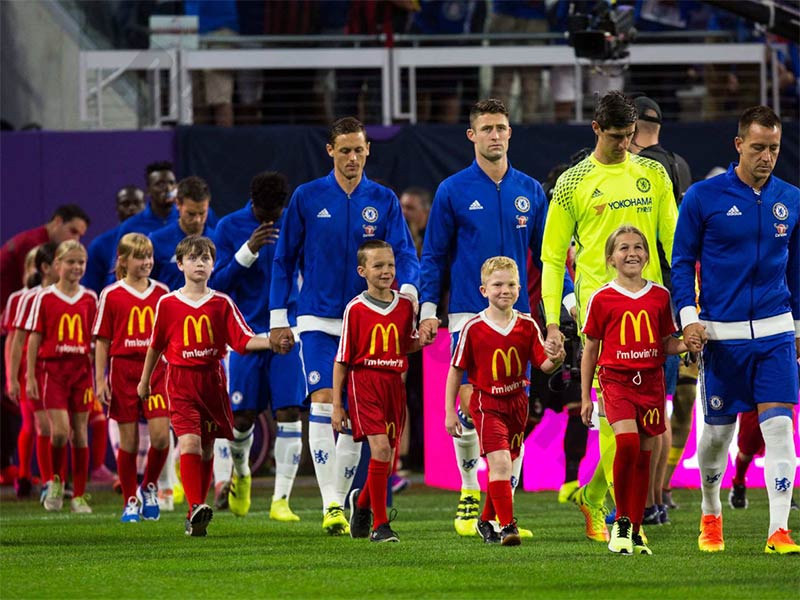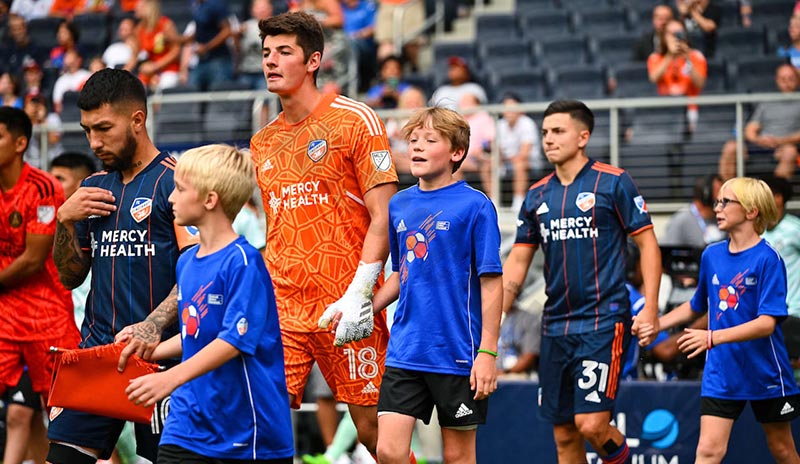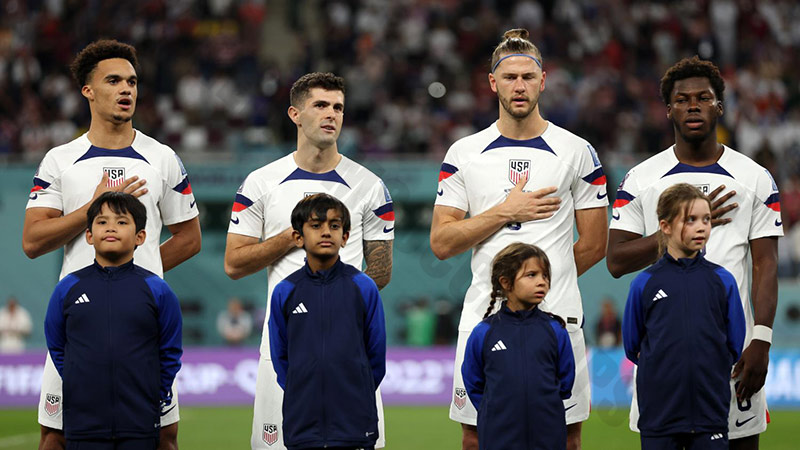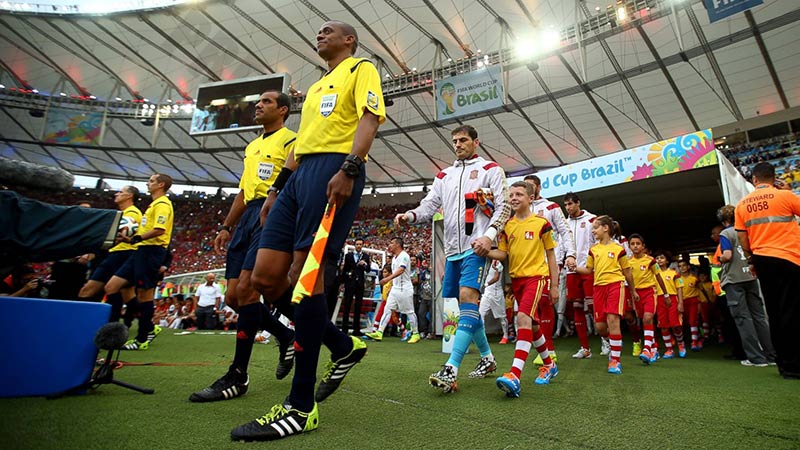Why do soccer players walk out with kids?
Why do soccer players walk out with kids? Soccer players always walk out with a child for many reasons. The most common reasons are to remind themselves of the great responsibility they have as mentors that children look up to, to support noble causes and campaigns for children, to demonstrate the innocence that the game should be about, and to fulfill children’s wishes or dreams. Let’s find out the reasons with Premiumsoccertips through the following article!

Why do kids walk out with soccer players?
A Brief Background
Unlike other football traditions, the practice of a player taking the field with a child has been around for quite some time, starting in the 1990s. However, the actual date of the first recorded case is unknown.
Some football historians believe that one of the main reasons for its rapid popularity is that it shows that the sport transcends generations and reminds guardians (players) of the great responsibility they have towards them.
Other historians believe that the adoption of this practice must have been unintentional because teams began to actively include children on their teams, who were called match escorts, child mascots or player escorts in their match programs.
Teams often had one child per player or one child per team to act as a mascot, hence the names player escorts and child/match escorts. However, the former alternative of having a child escort each player has become the preferred option as a large number of professional football clubs, particularly those in Europe, have official club mascots.
Some notable examples include Manchester United’s Fred the Red, Arsenal’s Gunnersaurus Rex, Newcastle United’s Monty the Magpie, Bayern Munich’s Berni, AC Milan’s Milanello and FC Barcelona’s L’avi del Barça (formerly Clam).
Becoming the norm
There are two football tournaments that are said to have popularised the practice of players leaving with a child to the point where it has become almost an unwritten rule – the 2000 UEFA European Football Championship (EURO 2000) and the 2002 World Cup.

Before Euro 2000, players would enter the pitch with their arms linked as a sign of camaraderie. This was often done until the playing of the national anthem, usually before the start of the match.
The 2002 World Cup took the practice to the level it is today, as it had a significantly larger audience than Euro 2000. At the time, many organisations were also working to champion children’s rights, including one of the tournament’s partners, UNICEF.
How are children selected to go out with the football players?
Most parents and children often wonder what it takes to be selected as a player escort or a child/child mascot. Some criteria are often applied with the minimum being that children usually have to be between 5 and 17 years old.
The reasoning behind this minimum requirement is simple – children under the age of five may feel overwhelmed walking out of the tunnel into a stadium filled with thousands of spectators while children over 17 are no longer considered children.
Other ways to select children as player escorts or child mascots include:
1. Reward Loyalty
Most professional football clubs typically have a fan base of registered supporters who are a major contributor to the team’s economy. These clubs often have internal loyalty programs that aim to reward committed fans.
Fans can be identified for a number of reasons including but not limited to holding season tickets or attending a certain number of games without missing. In a similar courtesy to a fan’s family, a club could offer their child that much-anticipated opportunity.

Following suit, the EPL recently launched a #MyPLWish competition offering undisclosed prizes to fans from the United States, Puerto Rico, Guam, the U.S. Virgin Islands and American Samoa.
2. Fulfill a Wish
Football clubs are also known for identifying and supporting young fans who are battling life-threatening or terminal illnesses by offering them the opportunity to become a player escort or club mascot. A prime example is former EPL side Sunderland, who chose the late Bradley Lowery – a child who unfortunately lost his battle with neuroblastoma in 2017 – as their mascot.
Other non-profit organisations such as the Make A Wish Foundation also work to make the wishes of seriously ill children come true, including those who want to experience playing with their favourite football team.
Most of these arrangements often involve more than just a pre-match escort, but can also include other club-related activities, provided the child, the child’s parents, the child’s doctor and carers agree.
3. Youth systems
Most top football clubs, especially those in Europe, have youth systems in place to nurture their next generation of players. Some notable examples of such academies include Barcelona’s La Masia, Chelsea’s Development Squad and Academy, Arsenal’s Football Club Academy and Manchester United’s Reserve Squad and Academy.

Such youth systems often seek to foster or reward emerging talent by allowing them to interact with their role models in the club’s senior squad, giving them the opportunity to seek advice and learn the intangibles that can only be gleaned from experiencing a real-life top-flight game.
4. By paying
Some football clubs have been known to offer parents the opportunity to have their children escort their favourite players onto the pitch for a fee. While it may not seem noble on the surface when compared to other avenues on this list, this approach has been known to be an effective way to raise funds for the clubs and the causes they support.
Some EPL clubs are said to charge parents a standard/fixed fee to have their children act as chaperones/mascots. The fees in question are said to range from £86 to over £1200 depending on the popularity and standing of the club.
Such opportunities are often offered on a first come, first served basis and there is a guarantee to parents that their child will be offered the opportunity at some point during a given season.
Conclusion
Football players walking onto the pitch with children is not only a beautiful image but also has many profound meanings. This tradition reminds players of their responsibility to set an example, support campaigns for children, and demonstrate the pure spirit of the sport. For clubs, this is a way to encourage loyalty, realize children’s dreams, and develop young talent. In addition, player escorts can also be organized through volunteer programs or by paying a fee. From major tournaments such as Euro 2000 or World Cup 2002, this tradition has become the norm, contributing to connecting the younger generation with the inspiring world of football.
See more: The Impact of the Messi to Inter Miami Transfer Fee on MLS








